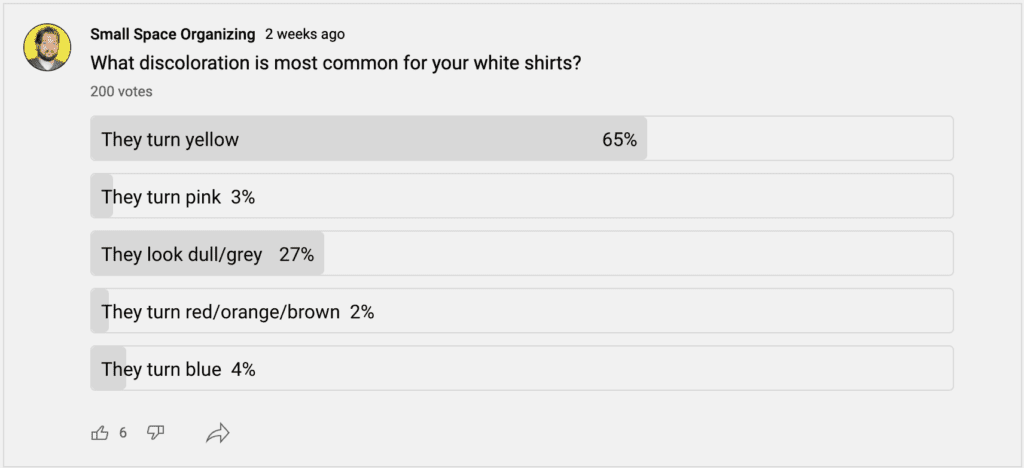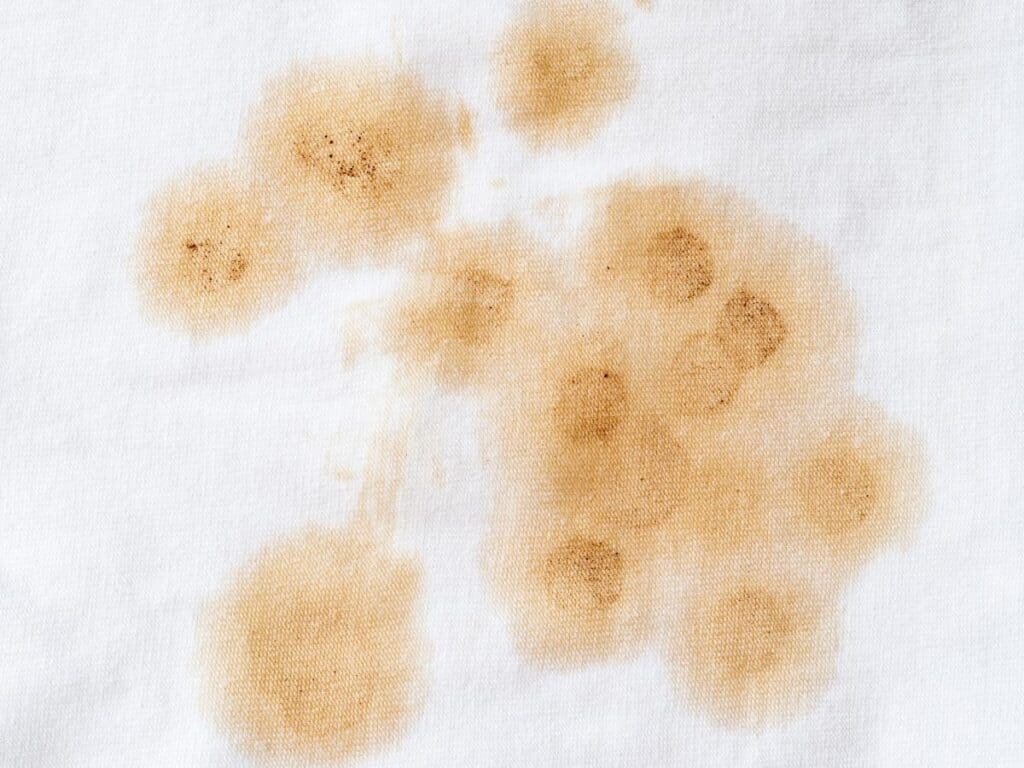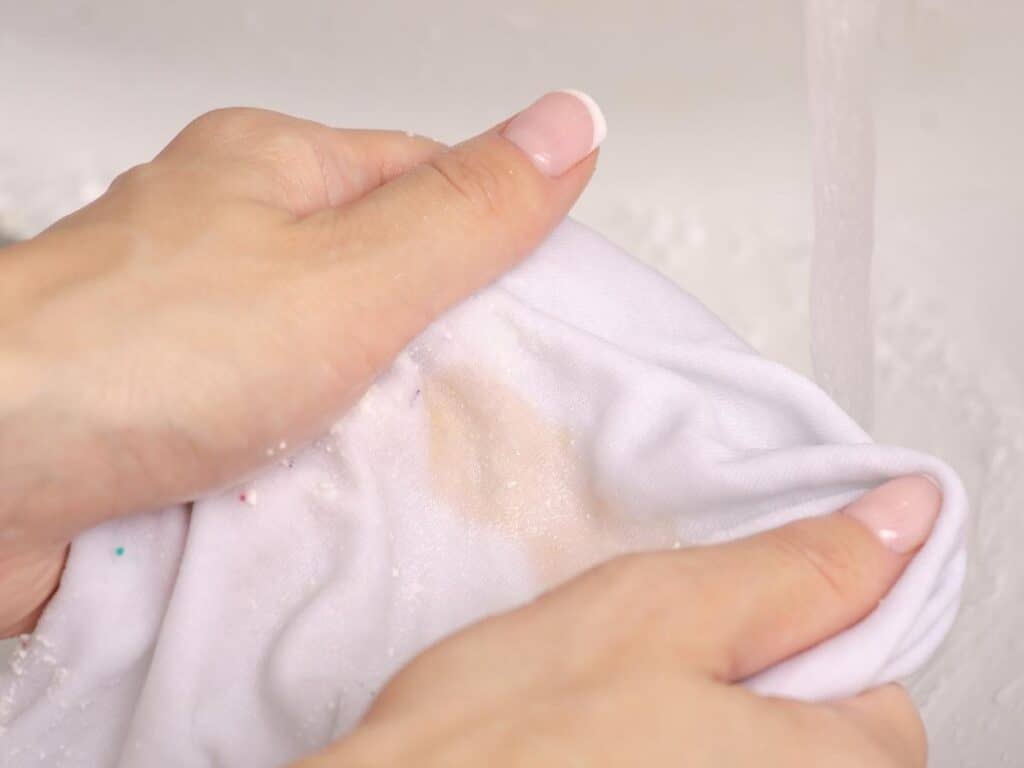It can be disheartening to see that your dirty clothes are still kind of dirty. After you get it out of the machine, there are brown flakes on it, and you can’t just wear your clothes with that, right?
How are you supposed to get rid of that?
Brown flakes on clothes and in the washing machine may be due to rust buildup, mold or mildew, excess detergent or fabric softener, or use of chlorine bleach. Cleaning the machine until all the brown stuff is out often helps. Changing the detergent or fabric softener used also helps.
This article will discuss how these flakes ended up in your clothes and how to get rid of them. It’ll also talk about brown spots in clothes after washing.
What Causes the Brown Flakes in Washing Machines?

It’s a hassle to rewash your clothes after washing them because of brown flakes or spots. To end that cycle, you’d need to get to the root or cause of the problem. So why are these brown flakes present?
Either rust may cause brown flakes in washing machines in the machine or oxide formation. It may also be due to the accumulation of mold or mildew.
The cleaning products used, such as detergent, bleach, or fabric softener, may also be culprit.
The following sections will discuss these reasons one by one.

The Brown Flakes May Be Rust Buildup
There can be two sources of rust buildup in a washing machine:
- Oxidation of iron parts
- Oxidation of iron or manganese from water
Oxidation of Iron Parts of Machine and Other Objects
Machines, especially old ones, can rust over time, which can then flake off and transfer onto the clothes, causing stains quite hard to remove.
Sometimes, the rust will form on machine parts out of sight, making it tricky to identify.
But how does rust exactly form?
Iron reacts with oxygen to form iron oxide, which is the reddish-brown rust flakes we see. Moisture and air can catalyze the reaction.
Since washing uses a lot of water, rust is likely to form over time, especially with no proper maintenance.
Aside from iron parts, there may also be coins or other objects stuck in the machine, which could also rust and cause brown flakes.
Oxidation of Iron or Manganese in Water
Aside from iron oxidation, manganese oxidation can also lead to rust formation. Iron or manganese may be present in water, especially if it’s sourced from deep wells that have contact with rocks.
These, when exposed to oxygen or chlorine components of detergent, may lead to a reaction that results in brown flakes.
Hence, the use of chlorine bleach or active oxygen detergents may lead to rust and brown flakes. Therefore, it’s suggested to avoid these products and see if it solves the problem.
There Is Mold or Mildew Buildup in the Machine
Mold or mildew buildup is a problem that people who inherited second-hand washing machines often experience. Often, previous owners forgot to dry out the machine, and over time, the mold accumulated.
A couple of rounds of machine cleaning might be able to get all of it out.
There may also be grime or dirt present in the hose, detergent holder, or other less conspicuous parts of the machine, which can also lead to mildew smell or brown stains on clothes.
Excess Detergent or Fabric Softener Is Used During Washing
Brown sludge, spots, and flakes are often attributed to excessive detergent and fabric softener. As we have mentioned, components in detergent can react with minerals in the water, leading to oxidation.
Meanwhile, fabric softeners can also respond with detergent to form a waxy sludge.
Excess of these products can also build up in certain areas, like the bottom of the machine, making the problem last longer.
What Are the Brown Spots on Clothes After Washing?
Aside from brown flakes, there are other reasons why brown spots or stains can appear on clothes after washing.
The brown spots on clothes after washing is due to the waxy buildup in washing machines that can cause staining or brown spots on clothes. This is a result of an interaction between the fabric softener and detergent and can be further aggravated by the use of cold water during washing.
Cleaning the machine using dishwasher tablets or citric acid may help remove this waxy buildup. Using warm water and avoiding excess detergent or fabric softener is also advised.
If you have to use fabric softener, follow proper maintenance to prevent buildup.
Which Type of Washing Machine Is More Prone to Brown Flakes?
Top loading washing machines are more prone to brown flakes than front load machines.
These may be because of the machine’s design, where excess minerals, detergent, grime, or flakes can build up easier than in a front-load machine.
These happen in areas with no strong water current.
Are There Any Solutions?

All isn’t lost with brown flakes in the machine and on clothes because there are solutions.
First off, though, if your machine is already quite old and very rusty, you might want to consider buying a new one instead.
I have made a list of the best washing machines to use with hard water.
I recommend that you check out this list as these washing machines are sturdy, having stainless steel drums, among other things.
A solution to brown flakes is cleaning the machine properly. You can use warm water, vinegar or citric acid, and baking soda during the cleaning cycle. If the machine has a cleaning cycle setting, use that.
Others recommend using citric acid, which can be sourced from lemon, lime, or even concentrated juice, more than vinegar. Some also say that bleach works better against mold or mildew.
Make sure to inspect other parts of the machine as well, like the hose or detergent dispenser. Clean them also if they are dirty.
I also have a guide on removing rust stains from the actual clothes that may interest you.
Final Thoughts

There are many possible reasons why brown flakes or spots appear in the washing machine or on clothes.
These may be due to mold, rust, excess detergent, chlorine, or other products being used.
It may take some trial and error to determine the cause, but these can be avoided through proper machine maintenance.
I wrote a comprehensive guide on why your clothes are changing color that covers every type of discoloration. Feel free to check it out next.

I’m an expert wardrobe organizer and a bit of a clean freak. I created this website and its YouTube channel to share practical guides about laundry and organizing. My teachings have been featured in multiple large news publications, and I’ve self-published two wardrobe organizing books and an entire course on the subject.
